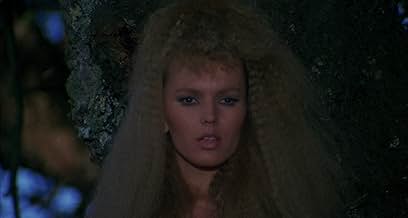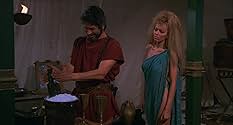Attila flagello di Dio
- 1982
- 1h 31min
NOTE IMDb
6,3/10
1,8 k
MA NOTE
Ajouter une intrigue dans votre langueThe misadventures of Attila and his band of barbarians as they take up arms against the Roman Empire in their native Milano.The misadventures of Attila and his band of barbarians as they take up arms against the Roman Empire in their native Milano.The misadventures of Attila and his band of barbarians as they take up arms against the Roman Empire in their native Milano.
- Réalisation
- Scénario
- Casting principal
Tony Kendall
- Serpicio
- (as Luciano Stella)
Avis à la une
Attila flagello di Dio epitomizes the particular strain of Italian comedy that emerged in the early 1980s, characterized by broad physical humor, anachronistic sight gags, and Diego Abatantuono's manic energy unleashed upon unsuspecting audiences. This historical parody, while undeniably entertaining for devotees of demential Italian cinema, suffers from the very excess that defines its cult appeal. The film's premise of transplanting barbarian warfare into contemporary Lombardy provides ample opportunity for comedic mayhem, yet the execution rarely transcends its own silly ambitions to achieve anything approaching satirical depth.
The directing duo demonstrates their usual competence in orchestrating elaborate comic set pieces, though their approach remains frustratingly scattershot. Individual sequences sparkle with inventive visual humor, particularly those involving the clash between ancient warrior customs and modern Italian life, but these moments feel isolated rather than building toward a cohesive comedic vision. The cinematography captures the frenetic action adequately without ever developing a distinctive visual style that might elevate the material beyond its televisual origins. The production design embraces the absurdist premise wholeheartedly, creating a convincingly ramshackle world where barbarian logic collides with bureaucratic reality.
Abatantuono delivers exactly the type of performance his fans expect, channeling his considerable charismatic presence into a role that demands maximum commitment to increasingly ridiculous situations. His portrayal of the delusional Attila balances genuine pathos with outrageous comedy, suggesting depths that the script rarely bothers to explore. Rita Rusic provides capable support as the romantic interest, though her character exists primarily to react to the masculine chaos surrounding her. Angelo Infanti brings professional competence to his supporting role, lending dramatic weight to proceedings that threaten to float away on their own absurdist winds.
The film's greatest weakness lies in its inability to sustain momentum across its running time. While individual scenes generate genuine laughter, the overall structure feels episodic rather than building toward meaningful resolution. The humor relies heavily on repetitive sight gags and cultural stereotypes that, while occasionally inspired, too often substitute volume for wit. The script's attempts to inject social commentary into its historical parody feel perfunctory, lacking the sustained satirical vision necessary to transform cultural observation into meaningful critique.
Despite these limitations, the film succeeds in creating an atmosphere of cheerful anarchy that proves infectious for audiences willing to embrace its deliberately lowbrow sensibilities. The musical score by Franz Di Cioccio and Franco Mussida provides energetic support for the visual comedy while avoiding the intrusive orchestration that mars many contemporary efforts. The supporting cast attacks their roles with appropriate enthusiasm, creating a sense of ensemble commitment that helps sell even the most preposterous comedic conceits.
The directing duo demonstrates their usual competence in orchestrating elaborate comic set pieces, though their approach remains frustratingly scattershot. Individual sequences sparkle with inventive visual humor, particularly those involving the clash between ancient warrior customs and modern Italian life, but these moments feel isolated rather than building toward a cohesive comedic vision. The cinematography captures the frenetic action adequately without ever developing a distinctive visual style that might elevate the material beyond its televisual origins. The production design embraces the absurdist premise wholeheartedly, creating a convincingly ramshackle world where barbarian logic collides with bureaucratic reality.
Abatantuono delivers exactly the type of performance his fans expect, channeling his considerable charismatic presence into a role that demands maximum commitment to increasingly ridiculous situations. His portrayal of the delusional Attila balances genuine pathos with outrageous comedy, suggesting depths that the script rarely bothers to explore. Rita Rusic provides capable support as the romantic interest, though her character exists primarily to react to the masculine chaos surrounding her. Angelo Infanti brings professional competence to his supporting role, lending dramatic weight to proceedings that threaten to float away on their own absurdist winds.
The film's greatest weakness lies in its inability to sustain momentum across its running time. While individual scenes generate genuine laughter, the overall structure feels episodic rather than building toward meaningful resolution. The humor relies heavily on repetitive sight gags and cultural stereotypes that, while occasionally inspired, too often substitute volume for wit. The script's attempts to inject social commentary into its historical parody feel perfunctory, lacking the sustained satirical vision necessary to transform cultural observation into meaningful critique.
Despite these limitations, the film succeeds in creating an atmosphere of cheerful anarchy that proves infectious for audiences willing to embrace its deliberately lowbrow sensibilities. The musical score by Franz Di Cioccio and Franco Mussida provides energetic support for the visual comedy while avoiding the intrusive orchestration that mars many contemporary efforts. The supporting cast attacks their roles with appropriate enthusiasm, creating a sense of ensemble commitment that helps sell even the most preposterous comedic conceits.
It's sad to notice that this movie has been shot just in Italy. The gags are really funny and if you want to make some laughs watching a movie.. well this is the one for you. A must-see if you are italian and you like this kind of movies!
A funny farcical comedy that tells the descent of a barbarian warrior from northern Italy to the south to plunder Rome. He will not succeed but on the way he will have a thousand adventures, one more absurd than the previous one.
10ghotz
Yes, this is film may be seen as trash, it's certainly a b-movie, but I think it needs to be put in the right context.
Most friends aged between 30 and 35 still remember most of the gags by memory and every time we talk about films at the pub, when we get to Italian commedies, it is mentioned (and everyone starts repeating all the gags).
I'm pretty sure there are a lot of Italian guys, from at least one generation, that consider this film a cult.
I agree, however, that if you don't fit in the above group you will just find it plainly stupid.
For what is worth, I think that the film has been re-mastered and that it should be available (at least in Italy)
Most friends aged between 30 and 35 still remember most of the gags by memory and every time we talk about films at the pub, when we get to Italian commedies, it is mentioned (and everyone starts repeating all the gags).
I'm pretty sure there are a lot of Italian guys, from at least one generation, that consider this film a cult.
I agree, however, that if you don't fit in the above group you will just find it plainly stupid.
For what is worth, I think that the film has been re-mastered and that it should be available (at least in Italy)
CAMP,TRASH,CULT.closer to a student movie than a film production, this is the "Scary Movie" of the Blair Witch Projects. extremely rare to find in any form,even bootleg,it exists only in original "live feed" italian and was removed when the then producer and now mass media master "got" the girl that stars as attila's wife,who's often naked in the film.
Le saviez-vous
- AnecdotesThe scene with the Gaul warrior in chains is a nod to a car commercial from 1981, which showed a Renault 18 breaking free from chains in a roman arena. This commercial was directed by Sergio Leone, with music from Ennio Morricone.
- ConnexionsFeatured in Cinemassacre Video: Top 10 Worst Top 10s (2013)
Meilleurs choix
Connectez-vous pour évaluer et suivre la liste de favoris afin de recevoir des recommandations personnalisées
Détails
- Durée
- 1h 31min(91 min)
- Couleur
- Rapport de forme
- 1.85 : 1
Contribuer à cette page
Suggérer une modification ou ajouter du contenu manquant


























